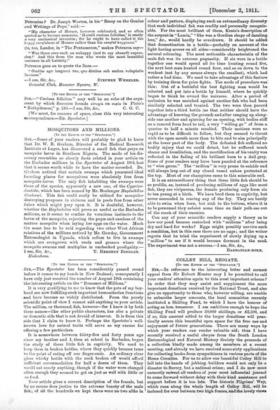I TO THE EDITOR OF THE "SPECTATOR. "] -Sra,—The Spectator has
been considerably passed round before it comes to my bands in New Zealand; consequently I have only just received the number of August 19th containing --the-interesting article on the " Romance of Millions."
It is very gratifying to me to know that the pets of my boy- hood are now fulfilling-such important humanitarian functions . and have become so widely distributed, From the purely scientific point of view I cannot add anything ta your article. The million, or thousand, fish, however—for I knew it by both these names—like other public characters, has also a private or domestic side that is not devoid of interest. It is from this side that I claim to know it. Perhaps the Spectator's well- known love for animal traits will serve as my excuse for offering .a few particulars.
It is• somewhere between thirty-five and forty years ago since my brother and I, then at school- in Barbados, began the study of these little fish in captivity. We used to keep them in broken bottles, where they quickly became tame to the point of eating off our finger-ends. An ordinary clear glass whisky bottle with the neck broken off would afford Sufficient accommodation for half a dozen of them. They would eat nearly anything, though if the water were changed often enough they seemed to get on just as well with little or so food.
Your article gives a correct description of the female, but tiy no means does justice to the extreme beauty of the male fish of all the hundreds we kept there were no two alike colour and pattern, displaying such an extraordinary diversity that each individual fish was readily and personally recogniz- able. For the most brilliant of them, Keats's description of the serpent in "Lamia," " She was a Gordian shape of dazzling hue," &c., would hardly be overdrawn. It should be added, that domestication in a bottle—probably on account of the light having access on all sides—considerably heightened the natural colouring. The most noticeable characteristic of the male fish was its extreme pugnacity. If six were in a bottle together one would spend all its time hunting- round five, the next best man hunted round four, and so on down to the weakest (not by any means always the smallest), which had rather a bad time. We used to take advantage of this feature by training them for prize fights. The mode of procedure was this: Oat of a bottleful the best fighting man would be selected and put into a bottle by himself, where he quickly began to think he owned the universe. After a period of seclusion he was matched• against another fish who had been similarly selected and treated, The two were then poured together into a third bottle (so that neither should have the advantage of knowing the ground) and after ranging up along- • side one another and sparring for an opening, with bodies stiff as a ramrod from head to tail, a very " willing go " of from a. quarter to half a, minute resulted. Their motions were so rapid as to be difficult to follow,- but they seemed to thrust with the open mouth more than to bite and to aim principally at the lower part of the body: The defeated fish suffered no bodily injury that we could detect, but he suffered much shame and humiliation, and the mortification of his vanity was reflected in the fading of his brilliant hues to a dull grey. Some of your readers may have been puzzled at the reference to "wire gauze." The "million" is very prone to suicide and will always leap out of any closed vessel unless protected at the top. Most of our champions came to this miserable end.
It is an extraordinary thing that these little-fish should be so prolific, as, instead of producing millions of eggs like most fish, they are viviparous, the female producing only from six to ten young at a birth. We have bred them in captivity, but never succeeded in rearing any of the fry. They are barely able to swim when born, but sink to the bottom, where it is to be presumed they subsist some time on their yolk-sac out of the reach of their enemies.
Can any of your scientific readers supply a theory as to how our pond became- restocked with " millions " after being dry and hard for weeks ? Eggs might possibly survive such a eandition, but in this ease there are no eggs ; and the writer regrets- that he tried the experiment of slowly drying up a " million" to see if it would become dormant in the mud, The experiment was not a success.—I am, Sir, &c.,
BARBADL&N-BORN.


































































 Previous page
Previous page